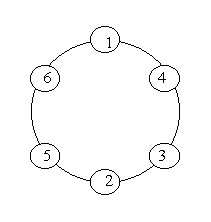Prime Ring Problem
Time Limit: 4000/2000 MS (Java/Others) Memory Limit: 65536/32768 K (Java/Others)
Total Submission(s): 34175 Accepted Submission(s): 15122
Problem Description
A ring is compose of n circles as shown in diagram. Put natural number 1, 2, ..., n into each circle separately, and the sum of numbers in two adjacent circles should be a prime.
Note: the number of first circle should always be 1.

Note: the number of first circle should always be 1.

Input
n (0 < n < 20).
Output
The output format is shown as sample below. Each row represents a series of circle numbers in the ring beginning from 1 clockwisely and anticlockwisely. The order of numbers must satisfy the above requirements. Print solutions in lexicographical order.
You are to write a program that completes above process.
Print a blank line after each case.
You are to write a program that completes above process.
Print a blank line after each case.
Sample Input
6 8
Sample Output
Case 1: 1 4 3 2 5 6 1 6 5 2 3 4 Case 2: 1 2 3 8 5 6 7 4 1 2 5 8 3 4 7 6 1 4 7 6 5 8 3 2 1 6 7 4 3 8 5 2
解题思路:
1.这题采用了查表法,用prime数组代替素数判断的方式,节省时间。
2.在dfs函数中新增了判断n的奇偶性,因为如果n为奇数,必定多出来一个奇数,根据奇偶性原理,奇+奇=偶,凡是偶数都不是素数,必错。
3.在judge函数中,通过循环剔除重复的成分,否则可能有重复因子(不信可以注释掉后试试)。
4.在dfs函数中没有包含首尾元素的判断,由于不可能为重,所以直接判断加和是否为素数即可。
备注:
dfs函数的t为数组角标,i为对应的数。
#include<stdio.h>
#include<string.h>
int a[20],n;
int prime[38]=
{
0, 0, 1, 1, 0, 1, 0,
1, 0, 0, 0, 1, 0, 1,
0, 0, 0, 1, 0, 1, 0,
0, 0, 1, 0, 0, 0, 0,
0, 1, 0, 1, 0, 0, 0,
0, 0, 1,
};
bool judge(int last,int x){
int i;
if(!((a[last]+x)&1)) return 0;
if(!prime[a[last]+x]) return 0;
for(i=0;i<=last;i++){
if(a[i]==x) return 0;
}
return 1;
}
void dfs(int t){
int i;
if(n&1) return;
if(t==n){
if(prime[a[0]+a[n-1]]){
printf("%d",a[0]);
for(i=1;i<n;i++){
printf(" %d",a[i]);
}
printf("\n");
}
}
else{
for(i=2;i<=n;i++){
a[t]=i;
if(judge(t-1,i)){
dfs(t+1);
}
}
}
}
int main(){
int k=1;
while(~scanf("%d",&n)){
memset(a,0,sizeof(a));
a[0]=1;
printf("Case %d:\n",k++);
dfs(1);
printf("\n");
}
return 0;
}
























 228
228

 被折叠的 条评论
为什么被折叠?
被折叠的 条评论
为什么被折叠?








